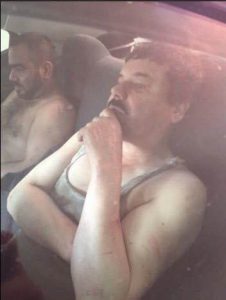POR Estephania Baez
Extraditing Mexican criminals who are considered dangerous tops the list of requests by the U.S. Government, who demands that they do their time in the country affected most by their crimes.
After Joaquin “El Chapo” Guzman was captured for the second time (in February 2014), U.S. authorities asked for his extradition in June 2015, arguing that the leader of the Sinaloa cartel had operated in 31 U.S. states beginning in the 1990s, the most affected of which were Texas, California, Illinois, and Pennsylvania. However, the drug kingpin escaped a month later, in July of 2015, triggering intense reward campaigns by the U.S., offering as much as $5 million for information leading to the location of Guzman.
According to public international law standards, in order for an extradition process to take place, the crime must be prosecutable in both countries. The first charges against Joaquin Guzman in the U.S. were filed by a Federal court in California in 1995, and these have charges been the basis of the petition to extradite the drug lord to the United States.
“We are seeking extradition for a certain number of individuals. Some others have already been extradited, and many have been arrested on U.S. soil, so it is a combination of all these factors,” indicated Laura Duffy, U.S. Attorney for the Southern District of California, in October, 2015, after Navy forces faced off against members of the Sinaloa Cartel.
Research indicates that Mexican drug cartels bring in about $60 billion per year from drug smuggling into the U.S. Early last year, the U.S. Attorney’s Office for the Southern District of California filed charges against 60 members of the Sinaloa Cartel, including Ismael Mayo Zambada, Joaquin “El Chapo” Guzman, and his son, Archivaldo Guzman. Authorities stated that as a result of their three-year investigation, these organized crime members are accused of trafficking enormous amounts of methamphetamines, cocaine, heroin, and marijuana into the U.S. During the course of the 3 years the investigation, enforcement agencies seized over 600 kilograms (kg) of methamphetamines, 1,000 kg of cocaine, 53 kg of heroin, 12 tons of marijuana, and $14 million in chemical precursors used in drug manufacturing. According to the DEA, these traffickers have used a variety of means to get their drugs across borders, and their activities have expanded beyond the U.S.-Mexico border. The presence of the Cartel has been detected in 54 different countries worldwide.
“Mission accomplished, we got him”, posted Enrique Peña Nieto, President of Mexico, via his social media accounts after the most wanted drug kingpin in history was in custody once more. The news sparked a series of questions regarding whether Joaquin “El Chapo” Guzman would be extradited to the United States; however, his legal defense team maintains that he should not be extradited based on the sovereignty of institutions to deliver justice. While Guzman was on the run, his defense attorneys filed injunctions to keep him from being extradited. In this regard, Mexico’s Federal Attorney General’s Office (PGR) issued a communiqué explaining that no injunction can impede the extradition process.
The U.S. Department of Justice released a statement congratulating the Mexican authorities for their work in apprehending the leader of the Sinaloa Cartel, as this marks a step forward in combating organized crime in both countries.
The U.S. DEA also issued a statement in which they express that the many crimes committed by Guzman Loera destroyed lives in both the United States and Mexico.
While Mexico’s Attorney General’s Office stresses that Joaquin Guzman’s extradition process could take between 1-4 years, U.S. authorities demand immediate action.